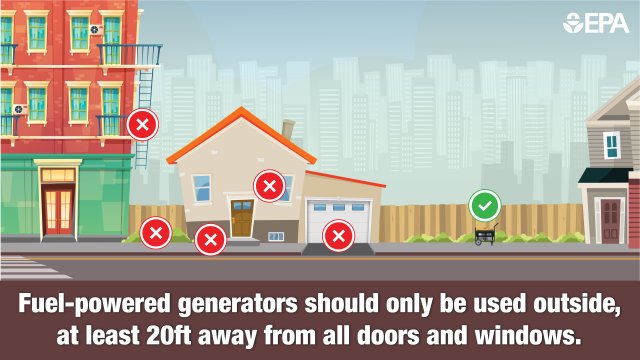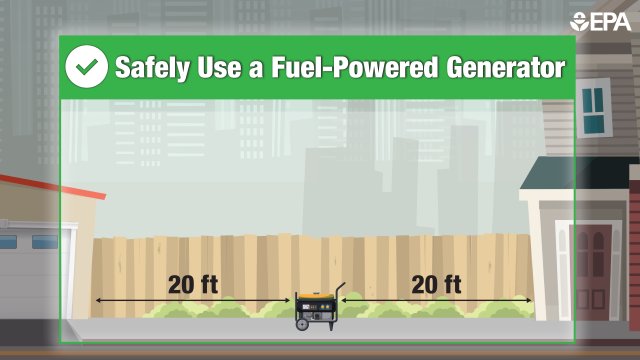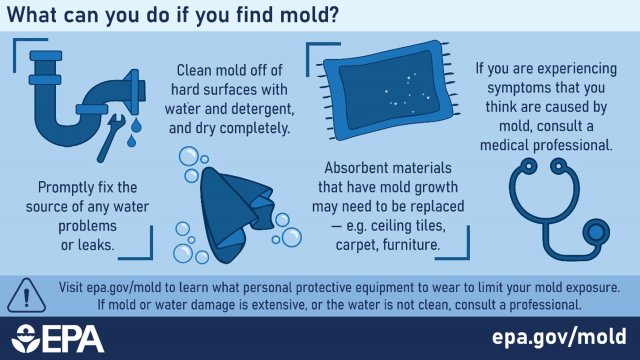Social Media Messages You Can Use During or After a Natural Disaster
Social Media Messages You Can Use During or After a Natural Disaster
ALWAYS CALL 911 if you are in immediate danger and need emergency help.
The messages below are for you to copy and reuse to share safety messages and information. Individuals, community leaders, responders, media, or anyone - just copy and paste the messages below into your Facebook, X, email, or other account to help spread the word to your friends and followers. More on EPA social media.
Topics listed below:
- Extreme heat
- Generator safety
- Asbestos
- Protecting those with vulnerabilities
- Home renovations
- Mosquito management
- Rodent management
- Flood recovery
- Hurricane preparation and hurricane
- Reporting hazardous spills or contamination
- Schools, facilities, businesses
Extreme heat
**Cool Your Community Social Media Kit with messaging and graphic also available for use
There’s plenty you can do to prepare for, or protect yourself during, an extreme heat event. Like @NWS says, “Stay hydrated, stay cool, and stay informed.” https://www.epa.gov/natural-disasters/extreme-heat
X
There’s plenty you can do to prepare for, or protect yourself during, an extreme heat event. Like @NWS says, “Stay hydrated, stay cool, and stay informed.” https://www.epa.gov/natural-disasters/extreme-heat
Generator safety


ALERT: Portable #generator exhaust is toxic and can kill you. ALWAYS run portable generators outside well away from doors, windows, and vents. NEVER use a generator inside your home, garage, shed, or similar enclosed areas. You can't smell or see carbon monoxide (CO), but it can be deadly. https://www.epa.gov/indoor-air-quality-iaq/power-outages-and-indoor-air-quality-iaq#safely
Headline: Always run generators outdoors
X
#Generator exhaust is toxic and can kill you. ALWAYS run portable generators outside far away from doors and windows. NEVER use a generator inside your home, garage or other enclosed areas. You can't smell or see carbon monoxide (CO), but it can be deadly. https://www.epa.gov/indoor-air-quality-iaq/power-outages-and-indoor-air-quality-iaq#safely
Asbestos
Cleaning up after a storm? If you suspect there may be #asbestos in your home, have a professional check before cleaning up by yourself. Airborne asbestos can cause lung cancer and mesothelioma. https://www.epa.gov/indoor-air-quality-iaq/resources-flood-cleanup-and-indoor-air-quality
Headline: Protecting yourself from asbestos after flooding
X
Cleaning up after a storm? If you suspect there may be #asbestos in your home, have a professional check before cleaning up by yourself. https://www.epa.gov/indoor-air-quality-iaq/resources-flood-cleanup-and-indoor-air-quality
Protecting those with vulnerabilities
Protect yourself and loved ones against hazards in a flooded home. Children and people with heart or lung issues like #asthma or who have weakened immune systems should not take part in disaster cleanup work. https://www.epa.gov/mold/homeowners-and-renters-guide-mold-cleanup-after-disasters
X
If your home has flooded, you should not allow children or people with heart issues, lung issues, or weakened immune systems to help clean up. https://www.epa.gov/mold/homeowners-and-renters-guide-mold-cleanup-after-disasters
Home renovations
Renovating your home after a storm? If your home was built before 1978, it may have building materials that contain lead-based paint. Activities like cutting and demolition can create #leadbasedpaint hazards. Learn how to keep you and your family safe. https://www.epa.gov/lead/post-disaster-renovations-and-lead-based-paint
X
Renovating your home after a storm? Make sure you and your family are safe from #leadbasedpaint hazards. https://www.epa.gov/lead/post-disaster-renovations-and-lead-based-paint
Mosquito management
Did you know mosquito populations and mosquito-borne illnesses can increase following storms? It’s important to eliminate standing water in rain gutters, old tires, buckets, plastic covers, toys, or any other container or surface where #mosquitoes can breed. Learn more about how to keep you, your family, and your community safe. https://www.epa.gov/insect-repellents/tips-prevent-mosquito-bites
Headline: Protecting yourself form mosquitoes following storms
X
Did you know mosquito populations and mosquito-borne illnesses can increase following storms? Learn how to keep #mosquitoes at bay. https://www.epa.gov/insect-repellents/tips-prevent-mosquito-bites
Rodent management
Hurricanes, floods, tornadoes, and pandemics can increase #rodent populations and vector-borne #diseases. Learn how to develop a pre-disaster plan to keep you, your family, and your community safe. https://www.epa.gov/rodenticides/about-rats-and-mice
Headline: Protecting yourself from rodents and disease following disasters
X
Hurricanes, floods, tornadoes, and pandemics can increase #rodent populations and vector-borne #diseases. Learn how to keep you, your family, and your community safe. https://www.epa.gov/rodenticides/about-rats-and-mice
Flood recovery
Flooding can damage septic systems, contaminate drinking water wells, bring mold, and more. Avoid any contact with flood water or sediment due to the threat of contamination. Learn more on how to keep you, your family, and others safe. https://www.epa.gov/natural-disasters/flooding#recover
Headline: Recovering After a Flood
X
#Flooding can damage septic systems, contaminate drinking water wells, and more. Learn how to keep your family safe from impacts of flooding: https://www.epa.gov/natural-disasters/flooding#recover
Hurricane preparation and recovery
Hurricane Prep one instagram (png)


It’s best to prepare for a potential hurricane before landfall. Make an emergency kit with essentials like water, non-perishable food, first aid items, flashlights, batteries, and cellphone chargers. Learn more: https://www.epa.gov/emergency-response/infographics-preparing-natural-disasters
Hurricanes and other natural disasters can have a negative impact on your health and your home. Take steps in advance like securing or storing paints and cleaning products properly around your home to mitigate household hazardous waste during and after hurricanes. https://www.epa.gov/natural-disasters/hurricanes#recover
Hurricanes and other natural disasters can have a negative impact on your health and your home. Take steps in advance like securing or storing paints and cleaning products properly around your home to mitigate household hazardous waste during and after hurricanes. https://www.epa.gov/natural-disasters/general-information-disasters#whatyoucando
X
It’s best to prepare for a potential hurricane before landfall. Make an emergency kit with essentials like water, non-perishable food, first aid items, flashlights, batteries, and cellphone chargers. Learn more: https://www.epa.gov/emergency-response/infographics-preparing-natural-disasters
Hurricanes and other natural disasters can have a negative impact on your health and your home. Take steps in advance like securing or storing paints and cleaning products properly around your home to mitigate household hazardous waste during and after hurricanes. https://www.epa.gov/natural-disasters/hurricanes#recover
Hurricanes and tropical storms can cause flooding, mold, drinking water contamination, lead paint hazards, and more. Learn to protect your family and the environment during and after a severe storm. https://www.epa.gov/natural-disasters/hurricanes#recover
It’s best to prepare for a potential hurricane before landfall. Make an emergency kit with essentials like water, non-perishable food, first aid items, flashlights, batteries, and cellphone chargers. Learn more: https://www.epa.gov/emergency-response/infographics-preparing-natural-disasters
Reporting hazardous spills or contamination
After a storm, if you become aware of an oil or chemical spill in your area, report it to the National Response Center at 800-424-8802. Remember, CALL 911 if you are in immediate danger or if someone is hurt. https://www.epa.gov/pesticide-incidents/how-report-spills-and-environmental-violations
Headline: Report spills or contamination
X
After a storm, if you become aware of an oil or chemical #spill in your area, report it to the National Response Center at 800-424-8802. https://www.epa.gov/pesticide-incidents/how-report-spills-and-environmental-violations
Schools, businesses, facilities

Flooding and mold can damage schools, business facilities, and other buildings. Learn more about how to clean up after a flood, including protecting indoor air quality. https://www.epa.gov/natural-disasters/general-information-disaster-preparedness-and-response#facilitywastewater
Headline: Recovery for schools or businesses
X
#Flooding and #mold can damage schools, business facilities. Learn more about flood cleanup and health. https://www.epa.gov/natural-disasters/general-information-disaster-preparedness-and-response#facilitywastewater
